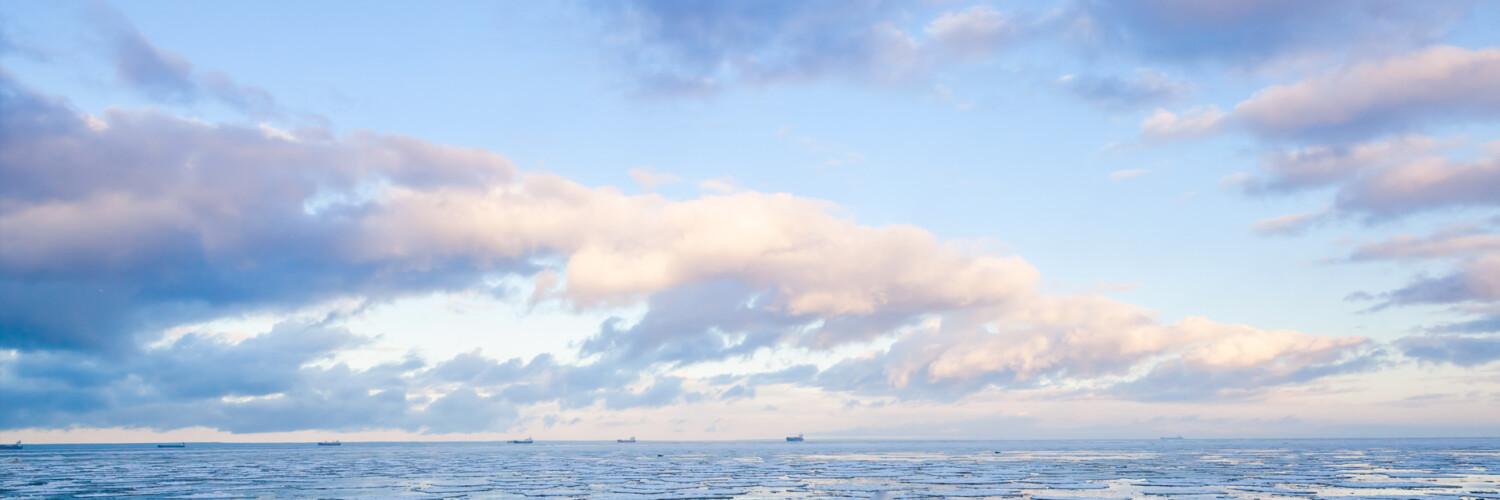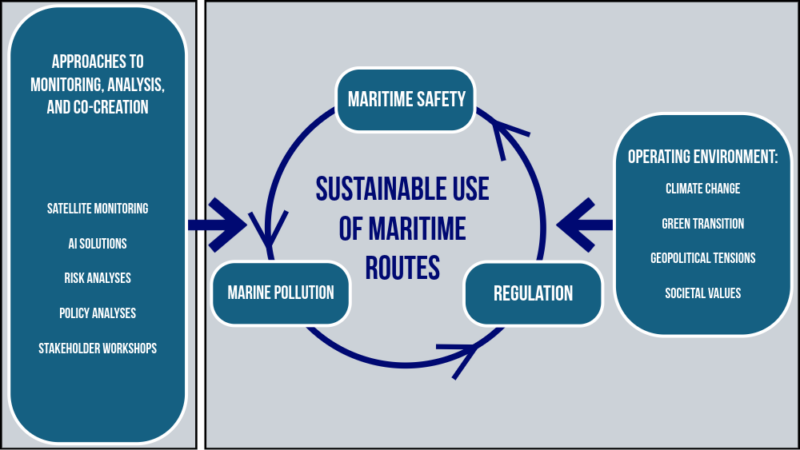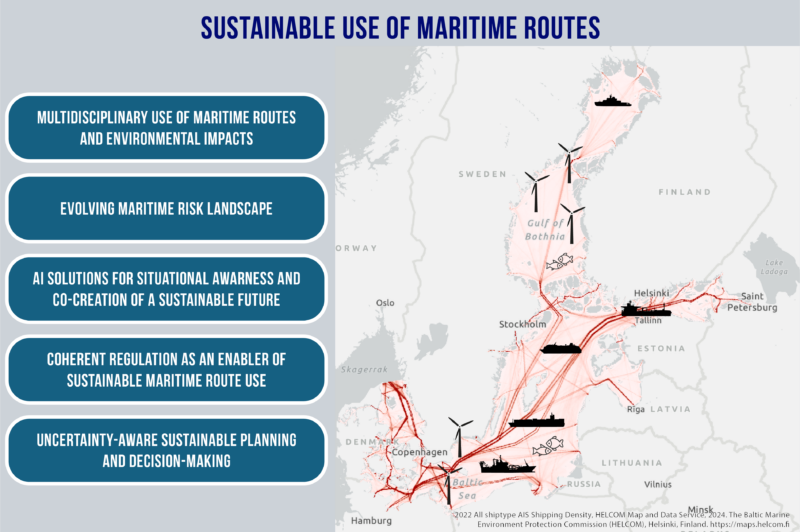
About the Project
WATERWAYS is a multidisciplinary research project that began in December 2024. It is part of the six-year Water for Welfare, Security and Peace (WAWE) programme, funded by the Strategic Research Council (SRC). The project has currently been granted funding for the period 12/2024–11/2027.
WATERWAYS examines the use of maritime routes in the Baltic Sea in light of the United Nations Sustainable Development Goals. The project consortium brings together perspectives and expertise from information technology, engineering, social and environmental sciences, as well as law.

The researchers address, on one hand, the well-being and opportunities generated by maritime traffic, and on the other, its negative environmental impacts and security risks. Through research findings and new tools, the project aims to provide (a) capabilities for maintaining an up-to-date operational situational picture, (b) resources for risk assessment and management, and (c) capacities and networks for cross-sectoral co-creation of sustainable future pathways.
Research Themes by Work Package

Multidisciplinary Use of Maritime Routes and Environmental Impacts (WP1)
WP1 examines the use of maritime routes in the Baltic Sea from a broad, cross-sectoral perspective. The aim is to build a shared understanding of the positive and negative impacts of maritime traffic in relation to the sustainable development goals identified in Finland’s key strategic documents.
The research applies process mining methods to model the use of navigation systems and maritime routes. AIS and GIS data are mined for insights, with the accuracy of analysis enhanced through the application of deep learning techniques. This enables the identification of various operational bottlenecks and problem areas. Expertise from outside the project consortium is also incorporated through a range of assessment and co-creation methods.
Environmental impacts of maritime traffic, such as emissions to air and sea, and underwater noise, are assessed using models developed by the Finnish Meteorological Institute. Of particular interest are the effects of different future scenarios, including the adoption of alternative fuels, on the marine environment.
The work package is led by Senior Researcher Jukka-Pekka Jalkanen from the Finnish Meteorological Institute.
Evolving Maritime Risk Landscape (WP2)
WP2 produces up-to-date models and assessments to support the understanding of the evolving risk environment in the Baltic Sea and to enhance risk management.
The green transition and the increasingly tense geopolitical situation are reshaping the security landscape and environmental risk profiles in the northern Baltic Sea in various ways. These developments must be taken into account in planning, legislation, and decision-making related to preparedness and risk governance.
Researchers investigate shifts in the maritime risk landscape and assess the environmental hazard risks posed by dangerous substances, as well as Finland’s national level of preparedness. Existing risk models are updated with the latest statistical data and new scenarios. New models are also developed to assess how offshore wind power may impact maritime traffic and risk management. The modelling approaches are based on probabilistic systems and decision analysis. The outcomes of these models provide improved insight into risk management needs, as well as the effectiveness, costs, and adaptive capacity of alternative measures under future uncertainties.
The work package is led by Associate Professor Osiris Valdez Banda from Aalto University.
AI Solutions for Situational Awareness and Co-Creation of a Sustainable Future (WP3)
WP3 develops and tests AI-based tools and methods for generating reliable situational awareness, identifying balanced compromise solutions, and co-creating sustainable and adaptive future pathways. These solutions are applied across other work packages.
Maritime actors have diverse impacts on the environment and on one another, as well as on their own needs and interests. At the same time, sustainability is a multi-dimensional and value-laden concept. Therefore, sustainable solutions for maritime spatial use are not straightforwardly optimizable; at best, they are carefully balanced compromises. Reaching such compromises requires up-to-date situational awareness of how various actors are using – and will use – marine areas, both individually and collectively.
This work package develops a novel system that integrates AI and satellite data to enable more reliable monitoring of maritime activities and emission sources. Researchers also explore and test AI-driven methods for identifying sustainable, equitable, and balanced compromise solutions. Additionally, the work package advances participatory scenario modelling methodologies to support the co-creation of sustainable future pathways.
The work package is led by Associate Professor Mashrura Musharraf from Aalto University.
Coherent Regulation as an Enabler of Sustainable Maritime Route Use (WP4)
WP4 aims to support the sustainable and safe use of maritime routes by promoting more coherent legislation and policy frameworks.
A wide range of actors utilize maritime space for different purposes. The combined impacts and risks of these activities are complex, and regulation in one part of the system inevitably affects other parts of the system. Poor communication between sectors and administrative branches can sometimes lead to unintended consequences, as solving one problem may unintentionally create new, potentially more severe or complex challenges. Fragmented and siloed political decision-making and sector-specific regulation often fall short in supporting sustainable maritime spatial use and may even create bottlenecks for sustainable development. Poor alignment between international, regional, and national regulations further complicates the situation.
This work package evaluates existing legislation in light of findings from the other work packages, identifying regulatory obstacles that hinder the safe and sustainable use of maritime routes, use that supports both environmental and human well-being. Based on this analysis, the researchers will provide policy recommendations to the Finnish government to improve risk management and enhance environmental monitoring of maritime traffic.
The work package is led by Professor Henrik Ringbom from Åbo Akademi University.
Uncertainty-Aware Sustainable Planning and Decision-Making (WP5)
WP5 focuses on planning and decision-making that takes into account future-related uncertainties and emphasizes adaptive capacity.
Sustainability is a multi-objective and value-laden concept. What is perceived as sustainable depends on the prevailing environmental and societal context. Priorities and values may change over time, generating what is known as value uncertainty. Sustainability trade-offs that are acceptable today may no longer be so in twenty years, or even in a month, should a sudden crisis occur. Even in the present, there is significant variation in values across social groups and individuals.
In addition to prevailing value landscapes, future perceptions of sustainability depend on how scenarios and perspectives are framed. Users of maritime routes interact with society, the environment, and one another in complex ways, and are also experts in these interactions. Therefore, future sustainable solutions are likely to emerge through co-creation and systems-based approaches that consider interdependencies.
This work package applies probabilistic decision analysis to evaluate and compare the sustainability of alternative measures and regulatory approaches under future uncertainty. Special attention is given to uncertainties related to value shifts and broader societal change. Toward the end of the project, researchers will organize a series of stakeholder workshops to co-develop sustainable future pathways. These workshops will draw on project results and participatory scenario modelling methods. The ultimate goal is to jointly develop a roadmap publication by maritime stakeholders.
The work package is led by Professor Sakari Kuikka from the University of Helsinki.